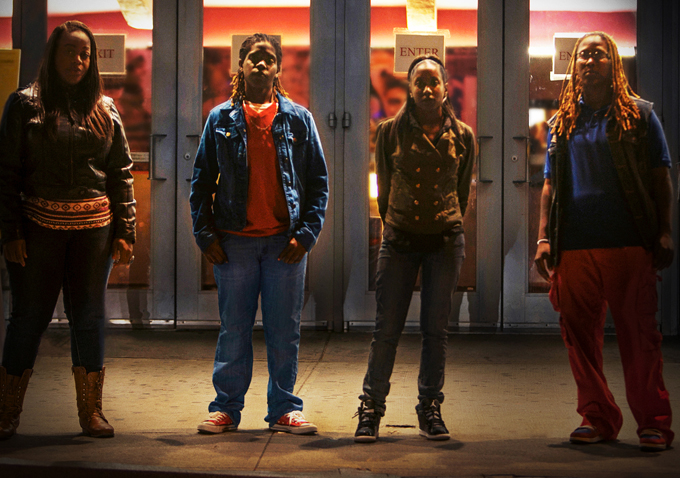
In 2007, four black lesbian women from New Jersey were sentenced to between 3 and 11 years in prison for varying degrees of gang assault against a man in New York City’s West Village. The New York Post and Daily News blared headlines about “bloodthirsty lesbians” and a “wolf pack,” and both the women’s sexuality and race were defining features of how the story was framed by the media and argued in the courtroom. “Out in the Night,” a documentary directed by blair dorosh-walter unpacks the real story of what happened that night and the subsequent consequences on the lives of the group of women known as the New Jersey Four.
In chronological order, the story of the incident goes something like this: seven girlfriends from Newark headed into New York City for a night on the town in gay-friendly Greenwich Village. A man selling DVDs outside of the IFC theater catcalled them, and when they informed him they were gay, he verbally and physically threatened them, and they fought back. The man ended up with a nick in his stomach from a knife one of the women was holding for protection. When the NYPD arrived, they arrested the women, who were celebrating their victory over their harassment and attack, carted them off to Rikers, and the tabloids made hay with the “lesbian wolf pack” story. Three of the seven plead guilty, while our four protagonists—Renata, Terrain, Venice, and Patreese—went to trial and ended up with convictions and jail time. All for defending themselves and their friends against sexual harassment and assault.
The story centers much on the lives and community of these women, and the effect that their incarceration had on their families. The film also details the legal drama, the prison experiences, the activists who took up their cause, and on the trial and incident itself. In many, many ways this was a huge miscarriage of justice that was no doubt predicated on issues of race and sexuality (as Angela Davis astutely questions: what if this had been a group of white women?). However, the real heart of the matter is self-defense and just how deadly it can be to defend yourself from or fight back the street harassment that is an unfortunately ubiquitous part of the female experience (#yesallwomen). It can be incredibly difficult for women to feel safe moving around in public, and we are both hypervigilant to physical and verbal threats, and inured to their constant presence. We’ve all probably fantasized, or acted on, fighting back, or in some way resisting this practice, and the case of the New Jersey Four illustrates how that can have terrible consequences in a system ruled by racism, sexism, and patriarchy.
While the story itself is compelling, shocking, and sad, and the women are eloquent and expressive in describing their experiences, the narrative structure, and unclear timeline hampers the thrust of the storytelling. The film opens with the four laughing, happy, dancing together in their community and hometown of Newark, before delving into the details of the case. This initial introduction is the first misstep that the film makes in its structure, as this framing device bleeds all tension from the proceedings. If we know they end up happy and okay and together, how can we really take the twists and turns of the investigation and trial following this seriously? It’s still devastating when the women are sentenced, and witnessing what their families go through is incredibly sad, but the disjointed and unclear timeline in the narrative structure of “Out in the Night” defuses much of the momentum and tension that it could have achieved. Furthermore, much of the score and soundtrack is far too overdone and ponderous, and with near-constant dramatic underscoring informing the emotion of the scenes, it loses its power.
“Out in the Night” is a crucially important story that needs to be told and shared with a wide audience, and is a timely tale that fits with the current feminist push back against misogyny and street harassment. Despite the problems with story structure and timeline, it’s a powerful tale, the details of which are far misunderstood by the public. dorosh-walter does a service in fighting back against the system by bringing the story of these women to light. [B]

